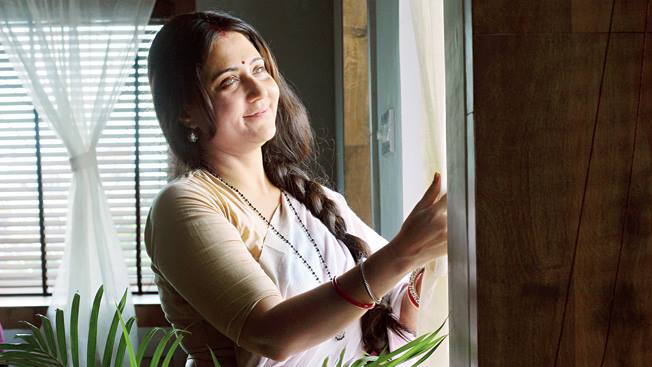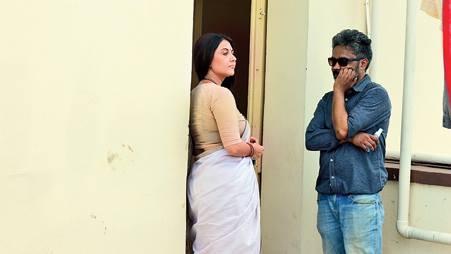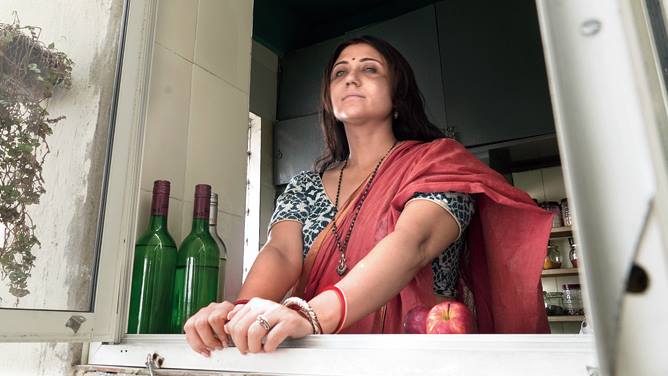The film Tasher Ghawr — which streams on Hoichoi from September 3 — tells the story of Sujata (Swastika Mukherjee), a Bengali homemaker stuck between the world that is around and within her. This story is about her home, her search and her self. A chat with Tasher Ghawr director Sudipto Roy...
What is the genesis of the film Tasher Ghawr?
The pandemic, the lockdown that followed, the realisation of loneliness, the acceptance of it and gradually being a part of a secluded world — all these contributed to the story’s inception. Sahana Dutta penned the story. I worked on a fresh draft of the screenplay and that’s how we have Tasher Ghawr.
What was the reason behind casting Swastika?
That’s the easiest and the most apt casting for this film. Sujata is not like Swastika but we all knew that Swastika is the perfect Sujata! In fact, Swastika knew about the story much before me. She had her inputs in many departments especially costume and her look.
What makes Swastika so special as an actress?
She is special in many ways. For me as a film-maker, she is the most obedient, hardworking, dedicated and pragmatic actor I have worked with. It’s easier for me to communicate my ideas (planned and unplanned!) to her. We do experiment a lot and she is always open to discuss, debate and add value to the script. She is singing a song in the film and she is above the bar in that as well. This is our third film together and it’s very special to us by all means.
What facets of Swastika the actress did you get to discover in the three films you directed her?
Kia and Cosmos was the first project we worked on and the schedule was quite stretched. But I think she was on point every time she was on set. Whether it was the first schedule in Kalimpong or the last one three months later, she was exceptional. In Afternoon Audition I really got hooked to her comic timing. It was that unpredictability in a woman that sometimes pleases you and also makes you laugh silently! I don’t know how she agreed to do that character, because there was hardly any script for her. We created the lines on spot and she delivered them with style and poise in the exact proportion. Tasher Ghawr is the toughest one! Sujata’s character is the most complicated one till now! We had a very tough schedule and the film is entirely about her. I am really hoping to present a refreshingly intriguing film with a brilliant Swastika Mukherjee!
Tell us about her look in the film?
She is a homemaker in the film. Like a quintessential Bengali housewife. It’s difficult to explain and validate a stereotype but the archetypical Bengali wife look is somehow a transcending factor in the film.
What is the film about?
The film is about Sujata. Her story of her marriage, her family and how a sudden lockdown can bring a drastic change in the life of an otherwise amicable woman. It’s a day’s story in between the lockdown where we see her doing daily chores of her household and narrating a bunch of interesting observations. She is funny and mysterious, I will keep it till this. The rest you can find out on September 3.

Swastika Mukherjee Sourced by the Telegraph
Why decide to shoot it during a pandemic? What were the main challenges of shooting this film?
Because our profession is all about making films... we are passionate about it and we all depend on it to survive and sustain. That’s the primary reason. The story is an important one and is very relevant to the times we are living in.
We shot the film with a small crew and it’s hectic and very challenging for the team. Everyone in my team worked for two individuals. Not just the shooting, we spent a lot of time in pre-production... and wearing masks and shields in a humid Calcutta August was quite taxing. The best thing is that we love making films and the challenges melt anyway when we are making a film!
How do you see film-making shaping up in the post-Covid world?
Post-Covid film business as a whole has suffered a huge setback. Halls are closed. The hope is OTT and I am glad that I got a chance to make one film. The scope has increased if you think about the crisis. Good films in history are made during a crisis, so I would say it’s a hopeful period for storytellers.
Do you feel our stories and the way they are being told will be different because of this pandemic?
Yes, of course! Stories are going to be more personal. We all have something to share about this lockdown. It’s a global phenomenon, a crisis that has pushed us back on the wall. But we all are dealing with it, isn’t it? Dealing with this new normal is unique for everyone and I feel those are the stories that shouldn’t be ignored.
Tell us about your philosophy of cinema? Your inspirations. What makes you interested in a project?
A student of cinema takes it up as a subject. I can try to make a film that perhaps brings me closer to the philosophy I profess or imbibe. I watch films to know how they make it. My inspirations are mostly real people, some living some dead.
A project excites me when I know that I will have a lot to contribute. If I know the subject then it’s more, if not I will research and find out.

Swastika with director Sudipto Roy Sourced by the Telegraph
You have a distinct style of film-making. But will that change if the subject or genre demands so? Or do you believe in a certain way of expressing yourself through cinema?
I don’t know if I have a distinct style of film-making because I think that it’s not intentional. What I feel I show in a film, and it’s not about my own thoughts also. I have a team who are dedicated practitioners of film-making. So, it’s a mix of everything. This collaboration itself is an evolving process, so my style has changed from project to project with time.
My expressions are not complete but I try to communicate the feeling as clearly as possible. This won’t change much! I would love to explore new genres and coin a few new ones as well if they allow me to.
There’s been a boom on streaming platforms and on television during the pandemic...
I have observed numbers and statistics over the last few months... trying to understand demographically what has changed in content consumption. I figured that OTT and online consumption has increased by 40 per cent or more. However, we are still not ready with a plan to suffice the demands. It’s time we all experiment with new stories. Let new voices under good guidance make more films, web series, short films etc.... It’s an exciting time to be in the content business and a paradigm shift is almost a reality.











